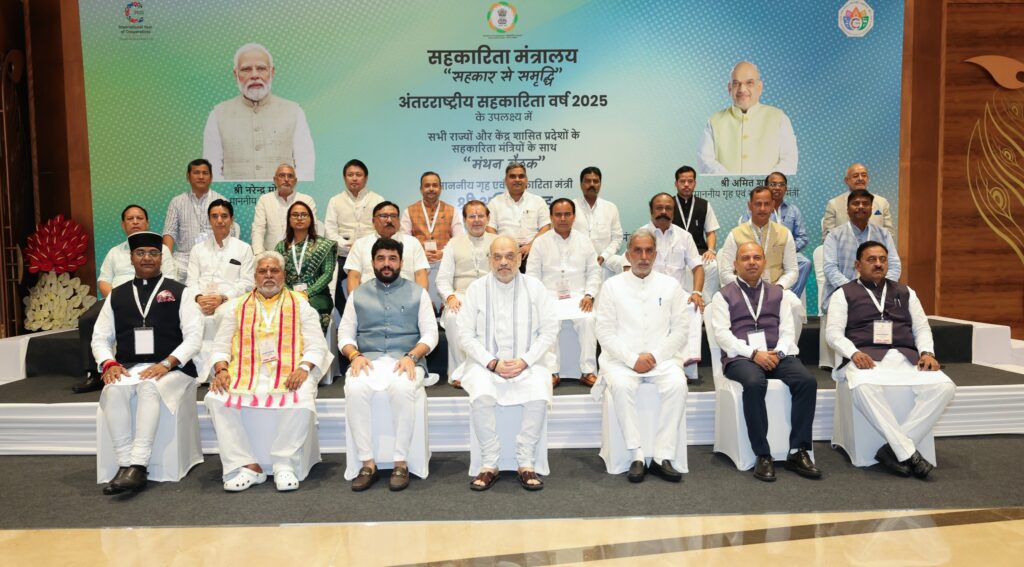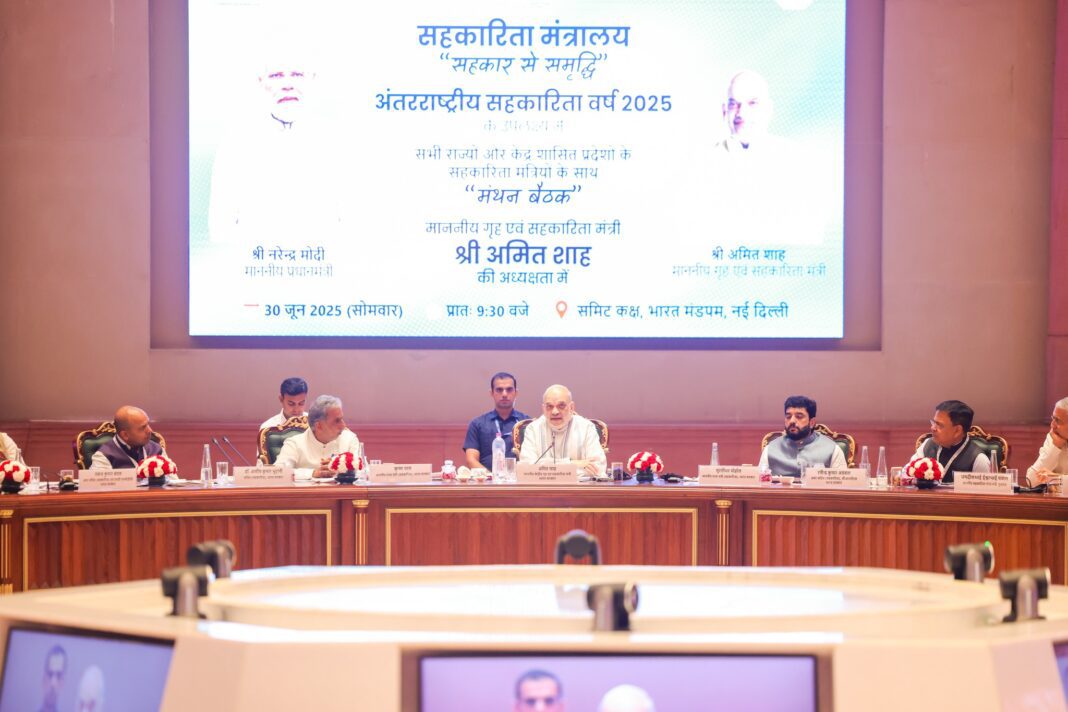In a landmark move, Union Home Minister and Minister of Cooperation, Shri Amit Shah, chaired a high-level “Manthan Baithak” with State and UT Cooperation Ministers in New Delhi to commemorate the International Year of Cooperatives 2025. Key announcements included the upcoming National Cooperative Policy 2025–2045, a national goal of having one cooperative in every Indian village, and reforms to boost transparency, capacity building, and digital governance in the cooperative sector.
Key Highlights at a Glance
- National Cooperative Policy 2025 to 2045 to be launched soon
- Deadline for State Cooperative Policies: 31 January 2026
- Goal: Cooperative presence in every village within 5 years
- Mandatory affiliation of training institutes with Tribhuvan Sahkari University
- Strengthening of 2 lakh Multi-Purpose PACS to be completed by Feb 2026
- Launch of National Cooperative Database to identify gaps and plan interventions
- Focus on reforms in Urban Cooperative Banks and Credit Societies
- Promotion of natural farming cooperatives with Agriculture Ministry collaboration
- Review of 3 new national-level cooperatives: NCEL, NCOL, BBSSL
- Push for digitalization, shared service platforms, and model cooperative act
Amit Shah Chairs Manthan Baithak to Drive Cooperative Growth Vision

To mark the International Year of Cooperatives 2025, Union Minister Shri Amit Shah chaired a nationwide “Manthan Baithak” on June 30, 2025, involving cooperation ministers from all States and Union Territories. Held in New Delhi, the event focused on accelerating India’s cooperative movement through policy innovation, grassroots implementation, and technology-driven governance.
“The Modi government aims to ensure that every Indian village has at least one cooperative institution within the next five years,” Shri Amit Shah declared during the event.
The meeting served as a strategic platform for reviewing the Ministry of Cooperation’s 60+ initiatives, and for aligning national priorities with local implementation plans.
National Cooperative Policy: A Vision for 2045
One of the most significant takeaways from the session was the announcement of the upcoming National Cooperative Policy, envisioned to guide India’s cooperative movement until 2045, aligning with the centenary of the country’s independence.
Key Directives:
- Every state must announce its own cooperative policy based on local needs by January 31, 2026.
- A unified Model National Cooperative Policy Act will bring discipline, innovation, and transparency across all states.
- The policy will support key economic sectors including agriculture, banking, rural entrepreneurship, organic exports, and seed security.
National Cooperative Database: The Backbone of Reform
Shri Shah revealed that a National Cooperative Database has been created to map all cooperative institutions and identify villages lacking any cooperative presence. This will become a planning and monitoring tool to ensure equitable growth and targeted intervention.
Tribhuvan Sahkari University: Driving Capacity Building
The Centre emphasized the need for a robust training ecosystem for cooperatives. Key mandates include:
- At least one cooperative training institute per state must be affiliated with Tribhuvan Sahkari University (TSU)
- Entire cooperative training and capacity building in states will be managed through TSU
- This is aimed at eliminating nepotism in recruitments and standardizing cooperative education
Urban Cooperative Banks & Credit Societies: Transparency First
Reforms discussed include:
- Bringing cooperative banks under the Banking Regulation Act
- Ensuring recruitment in cooperative financial institutions is merit-based
- Promoting transparent operations in Credit Cooperative Societies and Urban Cooperative Banks
- Setting up an umbrella organisation to monitor Urban Cooperative Banks
Natural Farming: The Cooperative Path Forward
The Manthan Baithak also highlighted the need for integrating natural farming cooperatives. Cooperation Ministers were directed to work closely with their counterparts in agriculture to promote eco-friendly farming models that enhance public health and environmental resilience.
Strengthening PACS and New Sectoral Cooperatives
The government reiterated its commitment to set up 2 lakh new Multi-Purpose Primary Agricultural Credit Societies (PACS) by Feb 2026, covering sectors such as:
- Dairy
- Fisheries
- Organic farming
- Foodgrain storage (under the world’s largest grain storage scheme in the cooperative sector)
Three New National-Level Cooperatives Reviewed
The Manthan Baithak also took stock of progress on newly launched entities:
- NCEL – National Cooperative Export Limited
- NCOL – National Cooperative Organic Limited
- BBSSL – Bharatiya Beej Sahkari Samiti Limited
These institutions are expected to revolutionize exports, organic agriculture, and indigenous seed security.
Digital Transformation and Shared Services
The Centre is aggressively pursuing:
- Full computerization of PACS and RCS offices
- Operationalizing Shared Service Entities (SSEs) for State and District Cooperative Banks
- Using the Cooperative Database as a digital planning tool
Sahkar Se Samriddhi: The Gujarat Model Goes National
Drawing from Gujarat’s success, the “Cooperation Amongst Cooperatives” model is being scaled nationally to boost resilience and self-reliance through federated cooperative structures.
Conclusion: Cooperation as a National Growth Engine

The Manthan Baithak 2025 signifies a deep strategic shift in India’s cooperative sector. With the upcoming National Cooperative Policy 2025, village-level targets, and digital planning tools in place, the Modi government is steering the cooperative movement toward becoming a pillar of grassroots economic empowerment.
As India gears up for India@100, this historic meeting sets the tone for inclusive, cooperative-led development for decades to come.




